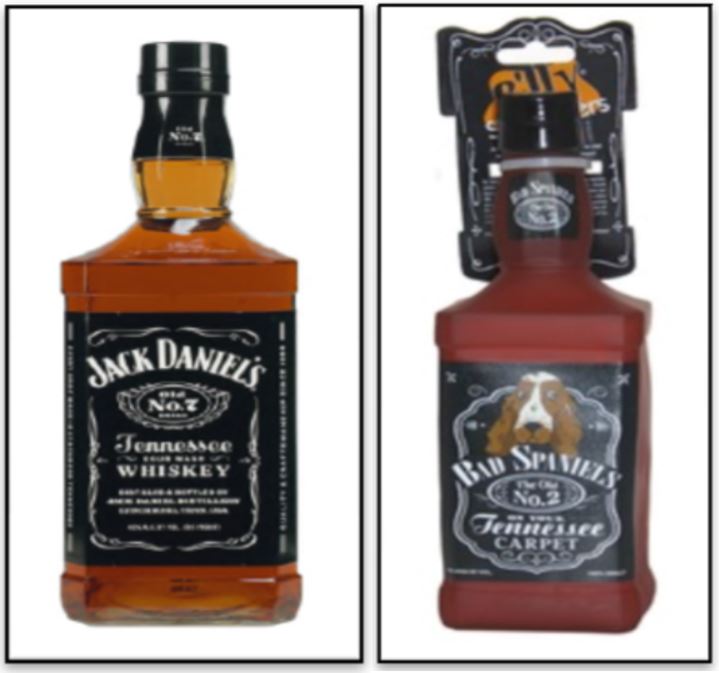Ninth Circuit Rallies in Defense of a Parody Dog Toy–Bad Spaniels v. Jack Daniel’s
So we are back to litigation over dog chew toys. The case involves the “Bad Spaniels” dog toy, part of a “Silly Squeakers” line from the smartly-branded enterprise “VIP Products.” The dog toy intentionally riffs on the Jack Daniel’s brand and trade dress, adding dog puns (principally scatological ones). The products side-by-side:
VIP Products claims its Silly Squeakers toys reflect “on the humanization of the dog in our lives” and comment on “corporations [that] take themselves very seriously.” This is a pretty generic parody defense. The lower court enjoined Bad Spaniels. The Ninth Circuit reverses and remands in a terse opinion.
Distinctiveness/Aesthetic Functionality. The elements of Jack Daniel’s bottle and label, taken together, are distinctive and non-functional.
Nominative Fair Use. The court implies that nominative fair use only applies to identical references, which is not the case here.
First Amendment. The Rogers v. Grimaldi First Amendment test requires the trademark owner to show “that the defendant’s use of the mark is either (1) ‘not artistically relevant to the underlying work’ or (2) ‘explicitly misleads consumers as to the source or content of the work.'” It doesn’t matter if the artistic work isn’t that great or is being sold commercially. The dog toy is eligible for a Rogers v. Grimaldi review because:
the Bad Spaniels dog toy, although surely not the equivalent of the Mona Lisa, is an expressive work. The toy communicates a “humorous message,” using word play to alter the serious phrase that appears on a Jack Daniel’s bottle—“Old No. 7 Brand”—with a silly message—“The Old No. 2.” The effect is “a simple” message conveyed by “juxtaposing the irreverent representation of the trademark with the idealized image created by the mark’s owner.”…Bad Spaniels comments humorously on precisely those elements that Jack Daniels seeks to enforce here. The fact that VIP chose to convey this humorous message through a dog toy is irrelevant.
The lower court didn’t apply Rogers v. Grimaldi, so the appeals court remands the case to do that review.
Dilution by Tarnishment. The court’s entire discussion of this claim:
When the use of a mark is “noncommercial,” there can be no dilution by tarnishment. 15 U.S.C. § 1125(c)(3)(C); see A.R.S. § 44-1448.01(C)(2). Speech is noncommercial “if it does more than propose a commercial transaction,” Nissan Motor Co. v. Nissan Comput. Corp., 378 F.3d 1002, 1017 (9th Cir. 2004) (quoting MCA Records, 296 F.3d at 906), and contains some “protected expression,” MCA Records, 296 F.3d at 906. Thus, use of a mark may be “noncommercial” even if used to “sell” a product. See Nissan Motor Co., 378 F.3d at 1017; MCA Records, 296 F.3d at 906.
Although VIP used JDPI’s trade dress and bottle design to sell Bad Spaniels, they were also used to convey a humorous message. That message, as set forth in Part II.C above, is protected by the First Amendment. VIP therefore was entitled to judgment in its favor on the federal and state law dilution claims. See Nissan Motor Co., 378 F.3d at 1017; MCA Records, 296 F.3d at 906.
Undoubtedly, this is a good dilution ruling. The court says that for dilution purposes, a commercially available parodic product nevertheless makes a noncommercial use of the parodied trademarks because the humorous message does more than propose a commercial transaction. (Note: I consider Bad Spaniels a parody, but the court never calls it that, and the opinion only uses “parody” 2x to describe other cases). If the Ninth Circuit really means this, it will become even more difficult for trademark owners to win dilution cases because secondary trademark users almost always do something more than merely propose a commercial transaction. But I don’t believe this panel’s articulation of the law predicts how future panels will rule, so this conclusion will probably have a short lifespan. Congress still desperately needs to clean up the messy non-commercial elements in the dilution statute.
Final Thought. If you are a trademark owner and you’re upset about parody dog toys…really? Your brand isn’t as precious as you think it is.
Case citation: VIP Products LLC v. Jack Daniel’s Properties Inc., No. 18-16012 (9th Cir. March 31, 2020)


Pingback: VIP v JDPI – BAD SPANIELS – NINTH CIRCUIT « Trademark Blog()